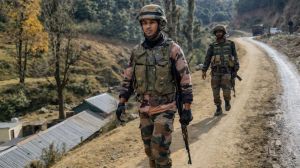Possessed by none
A symbol of India8217;s composite culture, Baba Farid, who lived in Punjab in the 12th and the 13th century, wrote the Sufi songs which are...

A symbol of India8217;s composite culture, Baba Farid, who lived in Punjab in the 12th and the 13th century, wrote the Sufi songs which are sung unchanged even today by millions. He wrote in Punjabi, his mother tongue and the language of his people. Acknowledged by every authority as the first major poet in Punjabi, four Shabads and 114 Shlokas of his are included in the Gurbani, by the Fifth Guru of the Sikhs, Guru Arjun Dev, in Guru Granth Sahib, thereby according a unique place of honour to him along with Kabir, Namdev and Ravidas. All these divine personalities sang in the people8217;s dialect. For a full 92 years, Farid shone like a polestar on the firmament of Indian mysticism. He possessed nothing and nothing possessed him except the name of God and love for his country.
Born at Khetwal village in Multan district in 1173 in a scholarly Muslim family, Farid was educated in the famous madrasa of Multan. His father Qazi Jamaaluddin was a very learned man who was well versed in Islamic jurisprudence. It was at Multan that Farid met his future preceptor, Khwaja Bhaktiar Kaki, who later established his headquarters at Mehrauli near Delhi. When Farid placed his turban at the feet of Bhaktiar Kaki for admission in the monastery, the Khanqah, the Sufi saint advised him to finish his education at Multan first and then travel extensively. His next five years were spent in Kandahar, Tehran and Khorasan. Farid also visited Mecca. Back home, he undertook the severest fasts including 8216;Chilla-e-Maltus8217; discipline of inverted suspension for 40 nights in a well at Uch in Sind. This is considered to be the hardest test for entry into the realm of mysticism. Only then did he seek his Master at Mehrauli. When Khawaja Moinuddin Chishti saw Farid he said: 8216;8216;Baba Bakhtiar, you have got a noble falcon who will not build his nest except on the holy tree of heaven.8217;8217;
After his preceptor8217;s death, Farid was declared the head of the Chishti Silsilah at Delhi. He moved to Ajodhan later known as Pak Pattan the Holy Ferry, now in Montgomery district in Pakistan. It is said when Timur was returning to his country in 1398 after the sack of Delhi, his horses suddenly stopped at Pak Pattan and refused to move, though he roared like a lion and whipped the horses. Finally an old man told him it was a sacred to a Sufi 8216;8216;whose ancestors migrated from Iran to escape death at the hands of your ancestors. His name is Baba Farid, the king of king.8217;8217; Timur dismounted from his horse and bowed to the Khanqah, spent the night in the dargah on the mat and pledged not to kill the innocents, only to break the pledge later.
- 01
- 02
- 03
- 04
- 05































